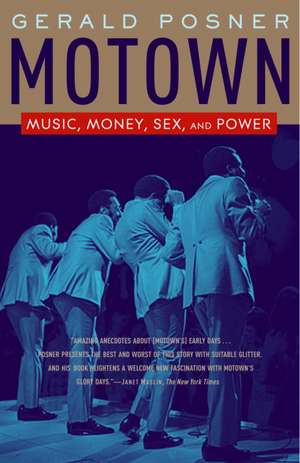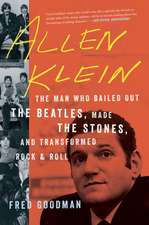Motown: Music, Money, Sex, and Power
Autor Gerald L. Posneren Limba Engleză Paperback – 30 sep 2005
Motown cuts through decades of unsubstantiated rumors and speculation to tell the true behind-the-scenes narrative of America’s most exciting musical dynasty. It follows the company and its amazing roster of stars from the tumultuous growth years in Detroit, to the drama and intrigue of Hollywood in the 1970s, to resurgence in 2002.
Set against the civil rights movement, the decay of America’s northern industrial cities, and the social upheaval of the 1960s, Motown is a tale of the incredible entrepreneurship of Berry Gordy. But it also features the moving stories of kids from Detroit’s inner-city projects who achieved remarkable success and then, in many cases, found themselves fighting the demons that so often come with stardom—drugs, jealousy, sexual indulgence, greed, and uncontrollable ambition.
Motown features an extraordinary cast of characters, including Diana Ross, Michael Jackson, Marvin Gaye, Smokey Robinson, and Stevie Wonder. They are presented as they lived and worked: a clan of friends, lovers, competitors, and sometimes vicious foes. Motown reveals how the hopes and dreams of each affected the lives of the others and illustrates why this singular story is a made-in-America Greek tragedy, the rise and fall of a supremely talented yet completely dysfunctional extended family.
Based on numerous original interviews and extensive documentation, Motown benefits particularly from the thousands of pages of files crammed into the basement of downtown Detroit’s Wayne County Courthouse. Those court records provide the unofficial—and hitherto largely untold—history of Motown and its stars, since almost every relationship between departing singers, songwriters, producers, and the label ended up in litigation.
From its peaks in the late 1960s and early 1970s, when Motown controlled the pop charts and its stars were sought after even by the Beatles, through the inexorable slide caused by their failure to handle their stardom, Motown is a riveting and troubling look inside a music label that provided the unofficial soundtrack to an entire generation.
From the Hardcover edition.
Preț: 133.80 lei
Nou
Puncte Express: 201
Preț estimativ în valută:
25.60€ • 26.73$ • 21.19£
25.60€ • 26.73$ • 21.19£
Carte disponibilă
Livrare economică 15-29 martie
Preluare comenzi: 021 569.72.76
Specificații
ISBN-13: 9780812974683
ISBN-10: 0812974689
Pagini: 350
Ilustrații: 16 PP PHOTOS
Dimensiuni: 134 x 203 x 22 mm
Greutate: 0.27 kg
Editura: Random House Trade
ISBN-10: 0812974689
Pagini: 350
Ilustrații: 16 PP PHOTOS
Dimensiuni: 134 x 203 x 22 mm
Greutate: 0.27 kg
Editura: Random House Trade
Recenzii
The book that answers the questions about the Motown nobody knows . . .
• Is there any truth to the rumor that the Mafia grabbed control of Motown after Berry Gordy ran afoul of violent loan sharks?
• Which Motown diva was almost run down by a station wagon after a blowout with a rival?
• How did Hollywood and the film industry sink Motown’s film business after the tremendous promise of Lady Sings the Blues?
• What famous star hid from Gordy that he was the father of her first child?
• What was the secret scheme one former executive says the company developed to steal millions of dollars in “suitcases of cash” from artists and songwriters?
• Which Motown star had a violent fight with Gordy on the day JFK was assassinated?
• Was the death of the Temptations’ Paul Williams by a single gunshot a suicide, as ruled by coroners, or a murder to silence him, as suspected by some colleagues?
From the Hardcover edition.
• Is there any truth to the rumor that the Mafia grabbed control of Motown after Berry Gordy ran afoul of violent loan sharks?
• Which Motown diva was almost run down by a station wagon after a blowout with a rival?
• How did Hollywood and the film industry sink Motown’s film business after the tremendous promise of Lady Sings the Blues?
• What famous star hid from Gordy that he was the father of her first child?
• What was the secret scheme one former executive says the company developed to steal millions of dollars in “suitcases of cash” from artists and songwriters?
• Which Motown star had a violent fight with Gordy on the day JFK was assassinated?
• Was the death of the Temptations’ Paul Williams by a single gunshot a suicide, as ruled by coroners, or a murder to silence him, as suspected by some colleagues?
From the Hardcover edition.
Extras
Chapter 1
Detroit Dreaming
Berry Gordy Jr. was the seventh of eight children, born in Detroit on Thanksgiving Day, November 28, 1929, just at the onset of the Great Depression. His father was the son of freed Georgia slaves who had become sharecroppers of a 168-acre patch of barren farmland that had yielded barely enough to keep the family going. Twenty-three children were born there, but fourteen died at or shortly after birth. Those who survived were tough. The mulatto Berry Gordy Sr.—his own father was the child of a slave and her white plantation owner—was a short, wiry man who did not get to high school until he was twenty-two because his family could not spare him from the backbreaking farming.
Berry Gordy Sr. was thirty—mature by local standards—when he married Bertha, a short, cute nineteen-year-old schoolteacher of African and Indian descent. In 1922, three years into their marriage, Gordy made a deal that changed their lives—he sold a load of the farm’s timber stumps for $2,600, a small fortune in rural Georgia. As word of the sale spread, the family worried that local whites might rob Gordy, so he traveled to Detroit, where his brother had recently moved, to cash the check. Once there, he never returned. Bertha and their three children joined him a month later.
The promise of assembly-line jobs in auto plants had lured many southerners to Detroit since the mid-1800s. The Motor City’s population boomed 1,200 percent during a fifty-year period that ended with the Great War. Ford was the first to break the racial barrier when it began hiring black workers in 1914. During the Roaring Twenties, Detroit had become America’s fifth-largest city and its second-fastest-growing. And although Jim Crow laws were still widely entrenched and the city largely segregated, to many southern blacks Detroit offered genuine possibilities for progress.
Berry Gordy Sr.’s start was not auspicious. Shortly after arriving, he used his share of the $2,600 windfall as a deposit on a cramped two-story home. It looked like a decent buy—at $8,500—until the Gordys moved in and discovered it was falling apart. Rotting plasterboard was hidden by fresh wallpaper, and bursting pipes had been concealed under duct tape. In the small space, the Gordys eventually had eight children who shared only three beds. Berry Jr. slept with his sister Gwen. The house was rat-infested, and the children often piled into the kitchen and watched in horror and fascination as their father killed giant rats. Once, a rat jumped from the oven onto Berry Sr.’s face, leaving him blood-covered and the children screaming in terror. For several years, Berry Sr. hustled through a string of odd jobs and frequently rented an empty lot where he sold everything from ice to coal, wood, Christmas trees, watermelons, and old car parts. Finally, he landed a gig as an apprentice plasterer for black contractors and in a year earned a union card. He then found steady work and saved enough to launch his own businesses. He not only started a carpentry shop but also bought the neighboring Booker T. Washington Grocery Store, as well as a print shop.
When Berry Jr. was six, his family sold their decrepit house and moved to a better, two-story commercial building on the city’s east side. (Years later, when Berry Jr. was a successful music mogul, he bought the street signs that marked the corner where their original home had been and planted them in his California backyard.)
Racial strife in Detroit worsened as Berry Jr. grew up. World War II saw almost two hundred defense plants open in the Motor City, and despite Franklin Roosevelt’s Fair Employment Practices Committee, almost one third refused to hire blacks. Poor whites flooded the city to fill new jobs, upsetting longtime black residents. In June 1943, white workers at a Packard plant went on strike when three blacks were hired to work next to them. Tensions boiled over a couple of weeks later, leading to three days of race riots and a bloody police response. Thirty-four people were killed, most of them black, and almost half by the police.
But the Gordys tried to steer clear of all this. Political discussions were not tolerated at the dinner table. Gordy’s parents had different concerns, ones shared by many middle-class black families: their energies were channeled into commerce, education, and discipline. Berry’s mother, Bertha, raised her eight children and still found time to study retail management at Wayne State University, as well as take business courses at the University of Michigan. She earned a degree from the Detroit Institute of Commerce and later was one of three founders of a life insurance company that specialized in residents of black neighborhoods. Berry’s father worked long hours and was frugal. The Gordys had a simple philosophy: family loyalty and hard work were the keys to happiness. The Gordy kids would start working in the family’s grocery store once they were tall enough to reach over the countertop. “There is strength in unity,” Bertha used to tell her children.
Both parents were strict disciplinarians, praising their children generously for good accomplishments but also meting out corporal punishment for transgressions. Serious infractions brought out an ironing cord that Berry Sr. wielded with little restraint, giving whippings that, Berry Jr. later said, “you didn’t forget.” Junior’s worst beating came once after his parents discovered that he had stolen some money from one of his older brothers.
But the tough discipline and emphasis on hard work paid off. Loucye, one of four daughters, was a typical product of the family’s mantra. She was the first black woman to become the assistant property officer at the nearby Fort Wayne army reserves. Her sisters, Esther, Anna, and Gwen, worked equally hard. The older Gordy sons were no different, with Fuller and George dutifully carrying out tough assignments in the family’s construction and printing ventures. However, the Gordy work ethic somehow seemed to dissipate when it came to the youngest sons, Robert and Berry. Both disliked manual work. A childhood family friend, Artie King, recalled the two brothers as “the two laziest guys in the world.” Robert preferred playing records in the basement and spending evenings at a local dance club, the Sedan. Berry also liked music, scribbling out a few rough songs and even winning a local talent contest for his “Berry’s Boogie,” a lively piece inspired by Hazel Scott’s popular “Boogie Woogie.”
Berry hung out on nearby Hastings Street, a colorful neighborhood through street filled with drunks, prostitutes, blues bars, poolrooms, a theater, and a half-dozen greasy spoons. During the day, the street was crammed with Orthodox Jews looking for goods to sell in pawnshops. At nights, hustlers—pimps, numbers runners, and gamblers—controlled the area. To Berry, Hastings Street offered something his family lacked: excitement. And he couldn’t understand why his father worked so hard to earn a barely decent living when numbers runners worked less and had thick stacks of cash.
CT’s, a busy barbecue joint, was also the local numbers headquarters. Berry was six when he played war, his first card game on the streets. Soon, the undersized kid moved from pitching pennies to craps, then to black- jack, and finally to poker. Although his parents were strictly against gambling, young Berry loved it and hid his new passion. He admired the flashy clothes and the sparkling Cadillacs that were the envy of the neighborhood. But he invariably lost to streetwise teenagers. The Hastings Street pawnshops got to know Berry when he was only fourteen. He brought them everything from suits to watches to raise money for more gambling. It was also along Hastings that Berry Jr. lost his virginity, paying a couple of dollars to a streetwalker for a few minutes in a dingy tenement.
With dreams of fast money and with little respect for formal education, Berry was, unsurprisingly, a poor student. He became a class clown to deflect attention from his failure to keep up with his classmates. Since he usually brought home report cards filled with D’s and F’s, his parents congratulated him when he managed to pull a C. To impress his teachers, Berry memorized the alphabet backward and raced through it for anyone who would listen. His parents and siblings were among the few who knew it was a memory trick and that he had basic problems reading. “I was so far behind the rest of the class,” he later recalled, “I just knew I had to be dumb.”
Berry’s school problems and his fascination with street hustlers angered his father. He considered his son lazy and lacking self-control, citing his tendency to sleep late, run perpetually behind schedule, and be a bed wetter until he was ten. Although Berry knew he was seen as a problem child, it did not reduce his own mighty self-esteem. He considered himself “the chosen one” and reminded his siblings that he was the one named after their father.
His father tried to instill discipline by placing him on contracting jobs. Berry hated having to get up early on cold mornings, knocking out dirty ceilings, sucking in dust, and feeling constantly tired. Soon, his father had him sell Christmas trees. But again, he scraped by on the bare minimum. When he complained, his father lectured him about how rough times had been in the South and how lucky the children were to have the opportunities available in Detroit. His father’s stories of hard work did not impress him.
Berry was anxious to find easier work away from his family. He and two friends set up a shoeshine stand outside the city’s largest department store. After that failed, he went door to door in white neighborhoods hawking the city’s largest black newspaper, the Michigan Chronicle. During that venture, he dabbled in something he really liked: music. Berry had a friend with a decent voice accompany him on his rounds. His friend sang “Danny Boy,” and if the family had a piano Berry banged out some rough chords or tried a chopped-up version of “Boogie Woogie.” Their “touring” ended when they failed to make any newspaper sales after a couple of months.
If the family’s work ethic failed to impress Berry, he was also unmoved by their religious devotion. At the Bethel AME Baptist church, preachers consistently roused the packed house in frenzied services. Sometimes one of the worshipers would feel the Holy Spirit and start shaking, occasionally even speaking in tongues. Most considered these moments special, but Berry found them only amusing.
Instead, he reserved his enthusiasm for boxing at neighborhood gyms. It was a sport that appealed to many local blacks because the Brown Bomber—heavyweight champ Joe Louis—had learned to box in Detroit. Sugar Ray Robinson had also been born there. In the 1930s and 1940s, boxing was the only professional sport in which blacks earned top money. It tempted Berry Jr.—as it had briefly his brothers Robert and Fuller—as a quick escape from the drudgery of his father’s twelve-hour days.
He thought of himself as “Killer Gordy.” At five foot six and 112 pounds, he was nonetheless a scrappy boxer who could take a hit and stand his ground. Working with weights, he bulked up to 125 pounds and the featherweight class. By then, he was sixteen and had fifteen fights—twelve wins—under his belt. He was certain that his fortune was not far off. So when he was kicked out of a music class, he abruptly quit school and turned pro, earning $150 a fight. He didn’t initially tell his parents, since he knew they would be furious. He left the house daily pretending that he was going to school. Instead, he went to the gym. When his parents uncovered the deception, they were devastated but failed to change his mind.
In 1948, when he was eighteen, he traveled to California, where he had three matches against two talented Mexican fighters. He won two. But after returning to Detroit, his career stalled as he began slacking off in his training.
As he grew frustrated, Gordy increasingly toyed with music as possibly offering fast fame and fortune. Some days he told friends he wanted to be like Sugar Ray Robinson, and on the next Nat King Cole was his idol. Young Gordy liked jazz, particularly Dizzy Gillespie, Miles Davis, and Charlie Parker. He hung out at the Club Sudan on weekends and then squeezed into the packed Greystone Ballroom and Gardens on Mondays, the only day the club—run by the Jewish Purple Gang, which had controlled liquor and graft in Prohibition-era Detroit—allowed blacks. Gordy loved those evenings, only plagued that he was awkward with girls. Nothing he said came out right.
When Gordy learned that Frankie Carle, a celebrated Hollywood big-band leader, was holding a local amateur night, he thought he might have found a way out of boxing. At the Michigan Theatre, he performed his “Berry’s Boogie.” Later, he dubbed his own performance “sensational” and bragged about wowing the judges and audience. Still, he lost to a five-year-old prodigy named Sugar “Chile” Robinson. When Gordy’s friends teased him about being beaten by a child, he earnestly told them that Robinson was a midget who had won by playing with his knuckles.
In August 1950, Gordy was twenty. In his brief boxing career, he had won thirteen of his nineteen professional bouts. He had finished a tough day of training at the Woodward Avenue Gym when, exhausted, his muscles throbbing, he plopped onto a bench near the back wall. As he wiped the sweat from his face, he glanced up and noticed two posters plastered on the far wall. He walked over to them. One advertised a “Battle of the Bands” between Duke Ellington’s outfit and Stan Kenton’s. The other announced a fight between two promising boxers.
He stared at both for a few minutes. The fighters, who were in their early twenties, looked like they were fifty, and the bandleaders, who were much older, seemed younger. He thought that whereas fighters were getting physically beaten, the musicians could perform nightly and never get hurt.
Gordy was all too pleased to abandon his morning runs, the punching bag workouts, the sparring rounds, the hundreds of aching sit-ups, and, most of all, the recommended sexual abstinence before a fight.
“The war that had been raging inside me,” he later wrote in his autobiography, To Be Loved, “music versus boxing—was finally over.”
From the Hardcover edition.
Detroit Dreaming
Berry Gordy Jr. was the seventh of eight children, born in Detroit on Thanksgiving Day, November 28, 1929, just at the onset of the Great Depression. His father was the son of freed Georgia slaves who had become sharecroppers of a 168-acre patch of barren farmland that had yielded barely enough to keep the family going. Twenty-three children were born there, but fourteen died at or shortly after birth. Those who survived were tough. The mulatto Berry Gordy Sr.—his own father was the child of a slave and her white plantation owner—was a short, wiry man who did not get to high school until he was twenty-two because his family could not spare him from the backbreaking farming.
Berry Gordy Sr. was thirty—mature by local standards—when he married Bertha, a short, cute nineteen-year-old schoolteacher of African and Indian descent. In 1922, three years into their marriage, Gordy made a deal that changed their lives—he sold a load of the farm’s timber stumps for $2,600, a small fortune in rural Georgia. As word of the sale spread, the family worried that local whites might rob Gordy, so he traveled to Detroit, where his brother had recently moved, to cash the check. Once there, he never returned. Bertha and their three children joined him a month later.
The promise of assembly-line jobs in auto plants had lured many southerners to Detroit since the mid-1800s. The Motor City’s population boomed 1,200 percent during a fifty-year period that ended with the Great War. Ford was the first to break the racial barrier when it began hiring black workers in 1914. During the Roaring Twenties, Detroit had become America’s fifth-largest city and its second-fastest-growing. And although Jim Crow laws were still widely entrenched and the city largely segregated, to many southern blacks Detroit offered genuine possibilities for progress.
Berry Gordy Sr.’s start was not auspicious. Shortly after arriving, he used his share of the $2,600 windfall as a deposit on a cramped two-story home. It looked like a decent buy—at $8,500—until the Gordys moved in and discovered it was falling apart. Rotting plasterboard was hidden by fresh wallpaper, and bursting pipes had been concealed under duct tape. In the small space, the Gordys eventually had eight children who shared only three beds. Berry Jr. slept with his sister Gwen. The house was rat-infested, and the children often piled into the kitchen and watched in horror and fascination as their father killed giant rats. Once, a rat jumped from the oven onto Berry Sr.’s face, leaving him blood-covered and the children screaming in terror. For several years, Berry Sr. hustled through a string of odd jobs and frequently rented an empty lot where he sold everything from ice to coal, wood, Christmas trees, watermelons, and old car parts. Finally, he landed a gig as an apprentice plasterer for black contractors and in a year earned a union card. He then found steady work and saved enough to launch his own businesses. He not only started a carpentry shop but also bought the neighboring Booker T. Washington Grocery Store, as well as a print shop.
When Berry Jr. was six, his family sold their decrepit house and moved to a better, two-story commercial building on the city’s east side. (Years later, when Berry Jr. was a successful music mogul, he bought the street signs that marked the corner where their original home had been and planted them in his California backyard.)
Racial strife in Detroit worsened as Berry Jr. grew up. World War II saw almost two hundred defense plants open in the Motor City, and despite Franklin Roosevelt’s Fair Employment Practices Committee, almost one third refused to hire blacks. Poor whites flooded the city to fill new jobs, upsetting longtime black residents. In June 1943, white workers at a Packard plant went on strike when three blacks were hired to work next to them. Tensions boiled over a couple of weeks later, leading to three days of race riots and a bloody police response. Thirty-four people were killed, most of them black, and almost half by the police.
But the Gordys tried to steer clear of all this. Political discussions were not tolerated at the dinner table. Gordy’s parents had different concerns, ones shared by many middle-class black families: their energies were channeled into commerce, education, and discipline. Berry’s mother, Bertha, raised her eight children and still found time to study retail management at Wayne State University, as well as take business courses at the University of Michigan. She earned a degree from the Detroit Institute of Commerce and later was one of three founders of a life insurance company that specialized in residents of black neighborhoods. Berry’s father worked long hours and was frugal. The Gordys had a simple philosophy: family loyalty and hard work were the keys to happiness. The Gordy kids would start working in the family’s grocery store once they were tall enough to reach over the countertop. “There is strength in unity,” Bertha used to tell her children.
Both parents were strict disciplinarians, praising their children generously for good accomplishments but also meting out corporal punishment for transgressions. Serious infractions brought out an ironing cord that Berry Sr. wielded with little restraint, giving whippings that, Berry Jr. later said, “you didn’t forget.” Junior’s worst beating came once after his parents discovered that he had stolen some money from one of his older brothers.
But the tough discipline and emphasis on hard work paid off. Loucye, one of four daughters, was a typical product of the family’s mantra. She was the first black woman to become the assistant property officer at the nearby Fort Wayne army reserves. Her sisters, Esther, Anna, and Gwen, worked equally hard. The older Gordy sons were no different, with Fuller and George dutifully carrying out tough assignments in the family’s construction and printing ventures. However, the Gordy work ethic somehow seemed to dissipate when it came to the youngest sons, Robert and Berry. Both disliked manual work. A childhood family friend, Artie King, recalled the two brothers as “the two laziest guys in the world.” Robert preferred playing records in the basement and spending evenings at a local dance club, the Sedan. Berry also liked music, scribbling out a few rough songs and even winning a local talent contest for his “Berry’s Boogie,” a lively piece inspired by Hazel Scott’s popular “Boogie Woogie.”
Berry hung out on nearby Hastings Street, a colorful neighborhood through street filled with drunks, prostitutes, blues bars, poolrooms, a theater, and a half-dozen greasy spoons. During the day, the street was crammed with Orthodox Jews looking for goods to sell in pawnshops. At nights, hustlers—pimps, numbers runners, and gamblers—controlled the area. To Berry, Hastings Street offered something his family lacked: excitement. And he couldn’t understand why his father worked so hard to earn a barely decent living when numbers runners worked less and had thick stacks of cash.
CT’s, a busy barbecue joint, was also the local numbers headquarters. Berry was six when he played war, his first card game on the streets. Soon, the undersized kid moved from pitching pennies to craps, then to black- jack, and finally to poker. Although his parents were strictly against gambling, young Berry loved it and hid his new passion. He admired the flashy clothes and the sparkling Cadillacs that were the envy of the neighborhood. But he invariably lost to streetwise teenagers. The Hastings Street pawnshops got to know Berry when he was only fourteen. He brought them everything from suits to watches to raise money for more gambling. It was also along Hastings that Berry Jr. lost his virginity, paying a couple of dollars to a streetwalker for a few minutes in a dingy tenement.
With dreams of fast money and with little respect for formal education, Berry was, unsurprisingly, a poor student. He became a class clown to deflect attention from his failure to keep up with his classmates. Since he usually brought home report cards filled with D’s and F’s, his parents congratulated him when he managed to pull a C. To impress his teachers, Berry memorized the alphabet backward and raced through it for anyone who would listen. His parents and siblings were among the few who knew it was a memory trick and that he had basic problems reading. “I was so far behind the rest of the class,” he later recalled, “I just knew I had to be dumb.”
Berry’s school problems and his fascination with street hustlers angered his father. He considered his son lazy and lacking self-control, citing his tendency to sleep late, run perpetually behind schedule, and be a bed wetter until he was ten. Although Berry knew he was seen as a problem child, it did not reduce his own mighty self-esteem. He considered himself “the chosen one” and reminded his siblings that he was the one named after their father.
His father tried to instill discipline by placing him on contracting jobs. Berry hated having to get up early on cold mornings, knocking out dirty ceilings, sucking in dust, and feeling constantly tired. Soon, his father had him sell Christmas trees. But again, he scraped by on the bare minimum. When he complained, his father lectured him about how rough times had been in the South and how lucky the children were to have the opportunities available in Detroit. His father’s stories of hard work did not impress him.
Berry was anxious to find easier work away from his family. He and two friends set up a shoeshine stand outside the city’s largest department store. After that failed, he went door to door in white neighborhoods hawking the city’s largest black newspaper, the Michigan Chronicle. During that venture, he dabbled in something he really liked: music. Berry had a friend with a decent voice accompany him on his rounds. His friend sang “Danny Boy,” and if the family had a piano Berry banged out some rough chords or tried a chopped-up version of “Boogie Woogie.” Their “touring” ended when they failed to make any newspaper sales after a couple of months.
If the family’s work ethic failed to impress Berry, he was also unmoved by their religious devotion. At the Bethel AME Baptist church, preachers consistently roused the packed house in frenzied services. Sometimes one of the worshipers would feel the Holy Spirit and start shaking, occasionally even speaking in tongues. Most considered these moments special, but Berry found them only amusing.
Instead, he reserved his enthusiasm for boxing at neighborhood gyms. It was a sport that appealed to many local blacks because the Brown Bomber—heavyweight champ Joe Louis—had learned to box in Detroit. Sugar Ray Robinson had also been born there. In the 1930s and 1940s, boxing was the only professional sport in which blacks earned top money. It tempted Berry Jr.—as it had briefly his brothers Robert and Fuller—as a quick escape from the drudgery of his father’s twelve-hour days.
He thought of himself as “Killer Gordy.” At five foot six and 112 pounds, he was nonetheless a scrappy boxer who could take a hit and stand his ground. Working with weights, he bulked up to 125 pounds and the featherweight class. By then, he was sixteen and had fifteen fights—twelve wins—under his belt. He was certain that his fortune was not far off. So when he was kicked out of a music class, he abruptly quit school and turned pro, earning $150 a fight. He didn’t initially tell his parents, since he knew they would be furious. He left the house daily pretending that he was going to school. Instead, he went to the gym. When his parents uncovered the deception, they were devastated but failed to change his mind.
In 1948, when he was eighteen, he traveled to California, where he had three matches against two talented Mexican fighters. He won two. But after returning to Detroit, his career stalled as he began slacking off in his training.
As he grew frustrated, Gordy increasingly toyed with music as possibly offering fast fame and fortune. Some days he told friends he wanted to be like Sugar Ray Robinson, and on the next Nat King Cole was his idol. Young Gordy liked jazz, particularly Dizzy Gillespie, Miles Davis, and Charlie Parker. He hung out at the Club Sudan on weekends and then squeezed into the packed Greystone Ballroom and Gardens on Mondays, the only day the club—run by the Jewish Purple Gang, which had controlled liquor and graft in Prohibition-era Detroit—allowed blacks. Gordy loved those evenings, only plagued that he was awkward with girls. Nothing he said came out right.
When Gordy learned that Frankie Carle, a celebrated Hollywood big-band leader, was holding a local amateur night, he thought he might have found a way out of boxing. At the Michigan Theatre, he performed his “Berry’s Boogie.” Later, he dubbed his own performance “sensational” and bragged about wowing the judges and audience. Still, he lost to a five-year-old prodigy named Sugar “Chile” Robinson. When Gordy’s friends teased him about being beaten by a child, he earnestly told them that Robinson was a midget who had won by playing with his knuckles.
In August 1950, Gordy was twenty. In his brief boxing career, he had won thirteen of his nineteen professional bouts. He had finished a tough day of training at the Woodward Avenue Gym when, exhausted, his muscles throbbing, he plopped onto a bench near the back wall. As he wiped the sweat from his face, he glanced up and noticed two posters plastered on the far wall. He walked over to them. One advertised a “Battle of the Bands” between Duke Ellington’s outfit and Stan Kenton’s. The other announced a fight between two promising boxers.
He stared at both for a few minutes. The fighters, who were in their early twenties, looked like they were fifty, and the bandleaders, who were much older, seemed younger. He thought that whereas fighters were getting physically beaten, the musicians could perform nightly and never get hurt.
Gordy was all too pleased to abandon his morning runs, the punching bag workouts, the sparring rounds, the hundreds of aching sit-ups, and, most of all, the recommended sexual abstinence before a fight.
“The war that had been raging inside me,” he later wrote in his autobiography, To Be Loved, “music versus boxing—was finally over.”
From the Hardcover edition.
Notă biografică
Gerald Posner, a former Wall Street lawyer, is an award-winning author of seven books on subjects ranging from Nazi war criminals, to assassinations, to the lives and careers of politicians. A regular investigative contributor to NBC’s Today show and panelist on the History Channel’s HistoryCENTER, he lives in Manhattan and Miami with his wife, author Trisha Posner. More information is available at www.posner.com.
From the Hardcover edition.
From the Hardcover edition.
Descriere
Posner tells the story of Berry Gordy's legendary record label, featuring an extraordinary cast of characters presented as they lived and worked: a clan of friends, lovers, competitors, and sometimes vicious foes.












